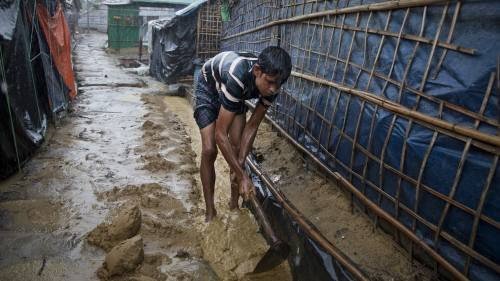Rain threatens to bring further disaster to refugees from Myanmar
A man cleans a drainage ditch in Cox's Bazar, home to almost 1m Rohingya Muslim refugees under threat from rain and landslides

Abdu Shukkur was working on a hill opposite his makeshift house when the rains started in Cox’s Bazar two weeks ago. In just a few hours, the valley between the hills flooded, so Mr Shukkur — one of nearly 1m Rohingya Muslims now living in the world’s largest refugee camp, in southern Bangladesh — decided to spend the night with friends rather than return home.
At 2.30am, he received a call from a neighbour. The rains had caused a mound of earth next to his house to collapse on to the mud wall he had constructed when his family fled here from Myanmar last year. His three-year-old son had been crushed to death in his bed and his wife was in hospital with serious injuries.
“When the Myanmar military came to my village last year, I picked my kids up in my arms and fled,” he said from outside his partially destroyed hut. “I managed to save them from the fighting, and I got them all the way here. But I couldn’t save my son from the rain.”
Last year, nearly 700,000 Rohingya fled Myanmar after a violent crackdown during which they say state security forces carried out mass killings, rapes and beatings. Having crossed the Naf river, they ended up in Cox’s Bazar, where they joined 300,000 of their compatriots who had fled previous rounds of violence
Aid agencies say the mass movement is unprecedented in terms of how many people arrived in such a small area and in such a short space of time. But having helped build temporary accommodation for many people, relief workers are worried that the arrival of the monsoon could bring yet more disaster to the refugees.
In the first few days of rain, three people died — including Mr Shukkur’s son — while 900 shelters, 15 water points, more than 200 latrines, two health facilities and two food distribution sites were damaged or destroyed. Aid agencies fear those numbers will increase significantly as the rains continue.
According to estimates by Unicef, 200,000 Rohingya refugees are under threat from flooding and landslides during the monsoon — three months in which 2.5 metres of rain is expected to fall.
Aid agencies say the mass movement is unprecedented in terms of how many people arrived in such a small area and in such a short space of time. But having helped build temporary accommodation for many people, relief workers are worried that the arrival of the monsoon could bring yet more disaster to the refugees.
In the first few days of rain, three people died — including Mr Shukkur’s son — while 900 shelters, 15 water points, more than 200 latrines, two health facilities and two food distribution sites were damaged or destroyed. Aid agencies fear those numbers will increase significantly as the rains continue.

Source
Plagiarism is the copying & pasting of others work without giving credit to the original author or artist. Plagiarized posts are considered spam.
Spam is discouraged by the community, and may result in action from the cheetah bot.
More information and tips on sharing content.
If you believe this comment is in error, please contact us in #disputes on Discord
what a work they are doing but please dont copy bro otherwise cheetah will take your work and put you in flag
Hi! I am a robot. I just upvoted you! I found similar content that readers might be interested in:
https://www.ft.com/content/fb5118c2-708c-11e8-92d3-6c13e5c92914
really a sad story.....
developed country and rich people should help myanmar to tackle at this situation
✅ @mdabulhasan, I gave you an upvote on your first post! Please give me a follow and I will give you a follow in return!
Please also take a moment to read this post regarding bad behavior on Steemit.
Good thinking. We should promote these type of contents to reduce these type of systems from the poor countries in the world & highlight these type of issues to international forums.
I upvoted you and followed you. In return you follow me and upvote my post to help grow each other. https://steemit.com/a/@navesumar/q-how-many-times-do-the-minute-hand-and-hour-hand-of-a-clock-make-an-angle-of-90-degree-in-a-day